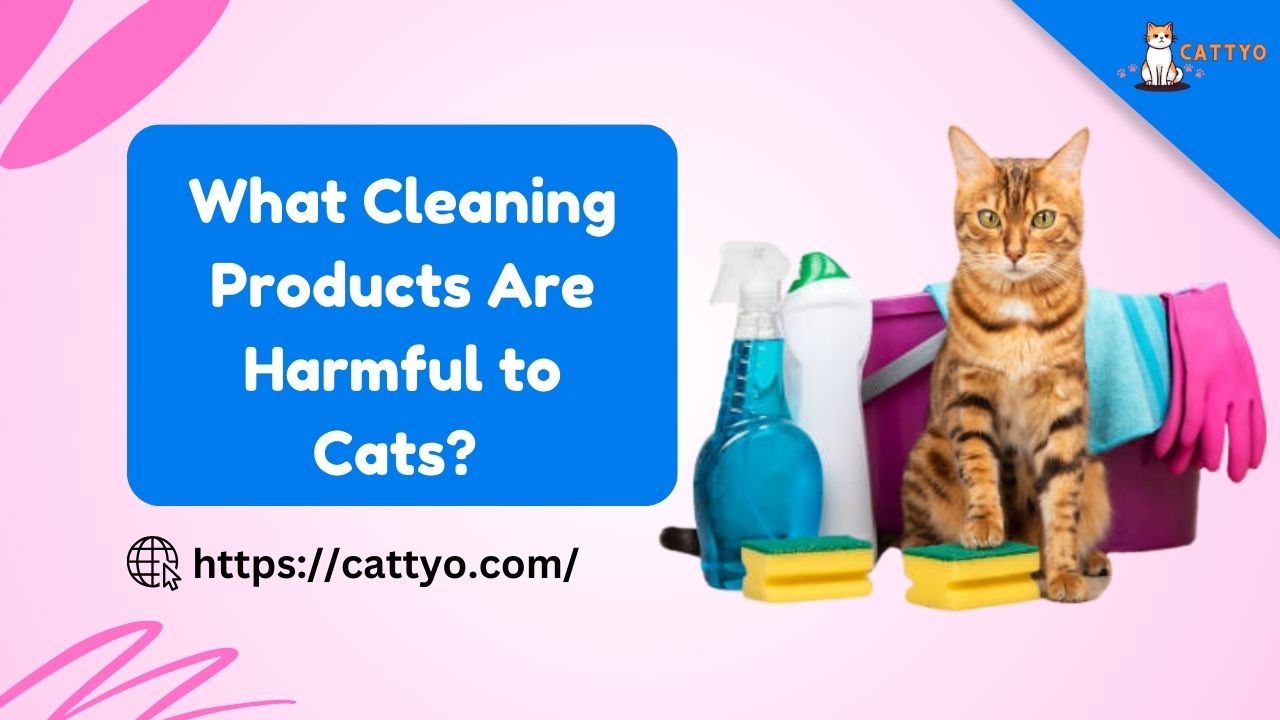If you’re a cat parent, you know that your furry companion has a curious nature. And while that’s endearing when they’re batting at a piece of string or chasing a flashlight beam, it’s not so cute when they start sniffing around your cleaning supplies.
In fact, some cleaning products—seemingly harmless to us—can be downright dangerous to our four-legged friends. So, what should you keep out of reach?
Let’s dive in and see what cleaning products are harmful to cats and how you can keep your home sparkling without putting them at risk.
The Hidden Dangers in Your Cleaning Cabinet
First, let’s get one thing straight: cleaning your home is important. A clean space means fewer germs, allergens, and a fresh environment for you and your cat.
But what if the very products you’re using to tidy up are doing more harm than good?
1. All-Purpose Cleaners: A Silent Threat
Many all-purpose cleaners are staples in our homes. From wiping down counters to scrubbing floors, we use them everywhere.
But did you know that many of these products contain chemicals like ammonia or bleach? These ingredients are not just unpleasant for your cat’s nose—they can be toxic if ingested or even inhaled in large amounts.
Picture this: You just wiped down the kitchen counters with a bleach-based cleaner, then your cat comes trotting along, sniffing around the freshly cleaned surface.
They don’t know the difference between a clean surface and a potentially harmful one. If they lick their paws or accidentally ingest a bit of residue, it could lead to symptoms like drooling, vomiting, or even more serious issues.
Real-life scenario: Think of it like this: if you’ve ever accidentally spilled bleach on your clothes and then gotten a whiff of it, you know how sharp and irritating the smell can be. Imagine that on your cat’s sensitive nose. Not a pleasant thought, right?
2. Floor Cleaners and Polishes: A Slippery Situation
Sure, floor cleaners make our tiles and hardwood shine, but many of them contain ingredients like glycol ethers, phthalates, or other volatile organic compounds (VOCs).
These chemicals can be harmful if ingested or inhaled by your cat, causing respiratory problems or even affecting their liver or kidneys over time.
And let’s not forget floor polishes—while they make your floors look gorgeous, they’re often slippery as well.
If your cat happens to run across freshly cleaned floors, they could easily slip and hurt themselves. Not exactly the type of “happy feet” we want for our pets!
3. Scented Products: Because Cats Are Sensitive to Scents
Cats have a highly developed sense of smell—far stronger than ours. So, while you might enjoy the fresh scent of lemon or lavender wafting through the air after cleaning, your cat might not be so thrilled.
In fact, strong scents from air fresheners, candles, or even scented cleaning products can overwhelm your cat’s sensitive nose and lead to irritation or respiratory issues.
Fun fact: Ever notice how your cat can sniff out something new or strange in your home in a matter of seconds? Imagine that heightened sense of smell encountering a scent that’s not just strong—it’s toxic.
4. Dish Soap: Not Just for Dishes Anymore
You might think dish soap is one of the gentler cleaning products in your home, but certain brands can contain ingredients like phosphates or bleach.
These substances can cause gastrointestinal issues if ingested, and let’s face it—cats are always looking to lick something.
If your cat happens to lick a surface that was just cleaned with a soap residue, they could ingest harmful chemicals without you even knowing it.
5. Drain Cleaners: The Big No-No
Drain cleaners often contain caustic substances like sodium hydroxide or sulfuric acid. These are powerful chemicals that can cause severe burns if they come in contact with your cat’s skin or if ingested.
Plus, even the fumes can be enough to make your cat sick. This is one cleaning product you definitely want to keep locked away.
So, What’s Safe to Use?
Alright, now that we’ve covered the “bad guys,” let’s talk about what you can safely use. The truth is, it’s all about finding products that are non-toxic and designed with pets in mind. Here are a few tips:
- Look for plant-based or natural cleaners: These often use ingredients like vinegar, baking soda, or essential oils (but always check if the oils are safe for cats first). Brands like Method or Seventh Generation are great options.
- DIY solutions: Why not make your own cleaning products? A simple mixture of vinegar and water can work wonders for most surfaces.
- Thoroughly rinse any cleaned surfaces: Even if you’re using a non-toxic cleaner, always make sure you wipe away any leftover residue. Cats love to lick surfaces, and even a small amount of cleaner could be harmful if ingested.
Table Of Common Harmful Cleaning Products and Their Alternatives
| Harmful Product | Toxic Ingredient(s) | Safer Alternatives |
|---|---|---|
| All-purpose cleaners | Ammonia, bleach, VOCs | Natural or plant-based cleaners |
| Floor cleaners/polishes | Glycol ethers, phthalates | Baking soda and water, vinegar solutions |
| Scented products (air fresheners, candles) | Synthetic fragrances, phthalates | Unscented products or essential oils (safe for cats) |
| Dish soaps | Phosphates, bleach | Natural dish soaps or homemade solutions |
| Drain cleaners | Sodium hydroxide, sulfuric acid | Baking soda and vinegar, plunger or snake |
FAQ Of What Not To Clean with Around Cats
1. What are the symptoms if my cat ingests harmful cleaning products?
Common symptoms include drooling, vomiting, diarrhea, lethargy, or difficulty breathing. If you suspect your cat has ingested something toxic, contact a vet immediately.
2. Can I use essential oils for cleaning around my cat?
Some essential oils, like tea tree, eucalyptus, or citrus, can be toxic to cats. Always research and use oils that are safe for pets or opt for pre-made, pet-safe cleaning products.
3. What are some general cleaning habits that will keep my cat safe?
- Always store cleaning products out of reach (like in a cabinet or pantry with a secure door).
- Thoroughly rinse any surfaces your cat will come into contact with.
- Opt for natural, pet-safe cleaning solutions whenever possible.
Final Recall : A Clean Home, Safely
Cleaning is a necessary part of life, but it doesn’t have to come at the cost of your cat’s health.
By being aware of the cleaning products you’re using and making small adjustments—like switching to safer alternatives or keeping harmful chemicals out of reach—you can create a safer environment for your furry friend.
After all, keeping them safe from harm while keeping your space sparkling is the best of both worlds.





